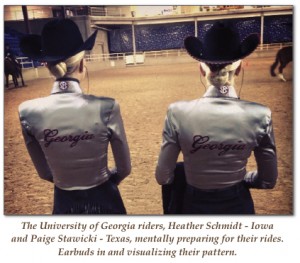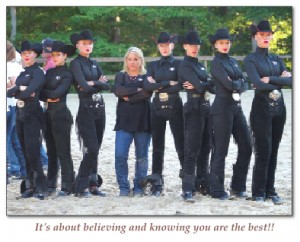Flexing Mental Muscle in the Show Arena
Click here to read the full article in our digital edition.
By Megan Arszman
You’ve practiced your spins and gait changes daily. You’ve cleaned your show clothes and polished your silver. Your horse is perfectly banded and shimmering from nose to tail. You’re ready for the show pen. All of a sudden, your horse takes a misstep in the warm-up ring and pulls a shoe. You have ten minutes before your first ride. Is it time to panic?
Battling the What-ifs
 If part of your daily practice has been working on your mental strength, this scenario isn’t a big deal. You would stay calm, cool, and collected and think about the appropriate steps you need to take to get your horse back in working order.
If part of your daily practice has been working on your mental strength, this scenario isn’t a big deal. You would stay calm, cool, and collected and think about the appropriate steps you need to take to get your horse back in working order.
“You’re thinking, ‘OK, how do we solve this?’ instead of wringing your hands and pulling your hair out saying, ‘I can’t believe I’m supposed to go in the ring in ten minutes and this happened,’” says Tonya Johnston, a mental skills coach based in California. “You can waste a lot of energy and time being distracted.”
Mental strength is just as important to your competitive edge as your skills as a rider. According to Johnston, it’s about being prepared to handle things as they come and staying completely in the moment. “Trust yourself to ride on instinct and feel,” she explains. “If distractions come up, you won’t suddenly become completely unfocused or allow the unexpected circumstance to derail you. Being able to be in the moment and ride your plan is, to me, being mentally strong.”
Mental toughness in the ring can help you in just about any situation. Whether it’s when someone cuts you off in a western pleasure class or something that happened even before you rode that day, your mental strength is going to serve you in all life situations, not just in the ring.
University of Georgia Equestrian Team coach Mary Meneely says mental strength is a major part of what the five-time National Championship Team is about. “Mental toughness is 90% of our game,” she says. “What we allow ourselves to think and speak creates the world around us, so I work daily with my riders on their thinking and speaking.”
“It all goes back to ‘The Little Engine That Could.’ Those hills in life can look like mountains. However, seeing those mountains as hills, and even valleys, can change your life and most certainly impact your results in the show ring.”
Mental Strength Workout
Johnston, who has ridden for 30 years on the hunter/jumper circuit, stresses to her clients that they need to build their self-awareness in order to build their mental strength. “Self-awareness is absolutely the first and biggest building block for building mental toughness,” she says. “It’s not just about fixing problems. You have to understand, when you have a great day, how that happened. What kinds of things did you do when you were preparing? What kinds of things were you saying to yourself? How was your energy? When you go forward, you can recreate those factors. You can build yourself a routine that gets you comfortable, confident, and consistent. When you understand what makes you ride well, it’s easier to recreate it day in and day out.”
Johnston recommends that riders start a journal about their rides to help them build self-awareness. Write down what you did before you rode. Did you sit in front of your horse’s stall and enjoy an apple? Did you give yourself some private time before you tacked up and rode? Think about the things you said and how you felt that day and write it down. Doing some reflection after your rides can also help build awareness, because you can think about what it is that you did throughout your ride to accomplish your goals.
Meneely and Johnston both agree that the use of video can also help build awareness in the saddle. “That’s what we did for the [Southeastern Conference Championships] this year,” Meneely says. “I chose the best ride of their collegiate career and had them watch it before they went to bed the night before the tournament. They watched their video and those emotions came up – that sense of accomplishment – all of those great things. Then, we talked about it. What did that feel like? What were you telling yourself? They saw themselves producing a great result. They felt it, they spoke it, and they created their world to be a place where they believed in themselves just enough.”
As a team coach, Meneely likes to spend time with her riders, not only to get to know them, but to help them get to know themselves. This focus on the aspect of inner strength is important to the Bulldogs, and Meneely takes the time to help the girls understand that they are their biggest competitors.
“We do a lot of not-on-the-horse classroom settings where we talk about what’s going on in our heads,” she says. “I have said, for years, that you have a little voice inside of your head. Sometimes, it’s very hard to calm or quiet that little voice down. We work daily on recognizing that voice in our heads and really our self-talk or self-speaking, how we speak to ourselves and what we listen to in our minds. A lot of times, we start believing what we’re thinking. Then, we start speaking it, and we’re creating our world as it comes out of our mouth.”
The team works on visualizing, setting goals, and finding their quiet space to release tension. “We work on speaking about what may be ‘stopping’ us in performing our best, and we look to alter our beliefs and speaking about that area.”
One way to practice this technique is by doing a dress rehearsal at home. Johnston recommends wearing full show attire, having your horse show-ready, and riding in a simulated class. This includes having an “announcer” and “showing” in a different arena than the one you warmed up in. Having a mock show will allow you to build on the discipline of riding in the moment and not just constantly picking at yourself and your horse. “You don’t want to be constantly critiquing yourself and evaluating your ride at the show. You want to practice at home the way that you want to ride at the show,” says Johnston.
Writing down positive affirmations on sticky notes or having inspirational sayings and photos visible is one way to help put you in the right frame of mind. At Georgia, Meneely has the girls write down their affirmations. One rider on the team, multiple AQHYA World Champion Rachel Kolb, puts her own unique spin on the affirmations. “Rachel came up with a word like sanguine,” she says. “We all looked at her like, ‘What the heck is sanguine?’ It means happy and joyful, and that’s just who she is when she’s on a horse. When she goes to that place when she’s competing, she’s unstoppable.”
Flex Your Mental Strength
“A lot of the mental skills and sports psychology skills I teach have to do with bringing your best to any performance or task,” Johnston says. “It’s not like, ‘I seem to have woken up on the right side of the bed today.’ It’s about being consistent and putting your best foot forward all of the time.”
It’s important to have goals that you want to accomplish during your riding career, but it’s also important to balance those goals. Johnston explains that if your goal for the World Show is to place in the top 10, you should think about what you need to do to improve your riding in order to be in the top 10.
“You might have your top 10 goal, and that’s all well and good,” Johnston explains. “But, if you’re riding around thinking, ‘I want a ribbon, I want a ribbon,’ then you’re not riding your horse effectively. Also, you want to be able to think about another [smaller] goal, like something you’ve been working on during your lessons. Then, you can come out of the ring and feel like you’ve made progress, regardless of [whether] you got a ribbon or not.”
Thinking in this respect helps you build confidence over time, because you’re making sure you’ve made progress and are improving.
In pattern classes, use the course as a place to demonstrate what you do well, rather than feeling like the course is a pass/fail exam. “You want to look at the pattern and say, ‘I’ve been working really hard on this part…’ and demonstrate that. Use the nervousness of excitement to show off your strengths,” Johnston says.
Control What You Can, Leave the Rest to Chance
 Being mentally strong also means that you must accept what you can and cannot control. Johnston reminds riders to think about the fact that they can’t control the judge, they can’t control the traffic in the ring, they can’t control the place they get, but they can control what they focus on. They can control their own goals, and they can control their own preparation.
Being mentally strong also means that you must accept what you can and cannot control. Johnston reminds riders to think about the fact that they can’t control the judge, they can’t control the traffic in the ring, they can’t control the place they get, but they can control what they focus on. They can control their own goals, and they can control their own preparation.










